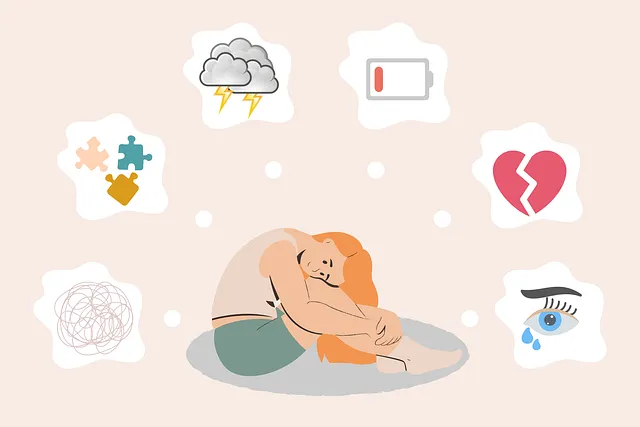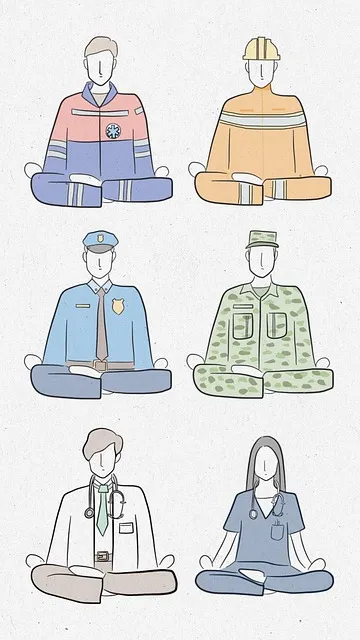Longmont Kaiser Permanente psychiatry focuses on Resilience, Frequency, and Moment (RFM) in their Mental Wellness Coaching Programs, empowering individuals with emotional regulation skills for stress and anxiety management. This evidence-based approach integrates RFM exercises into CBT models, enhances coping mechanisms, and prevents burnout among healthcare professionals. Through tailored programs, community engagement, and accessible resources, Longmont Kaiser Permanente psychiatry improves patient outcomes and creates resilient communities.
“Longmont Kaiser Permanente Psychiatry has pioneered innovative approaches to mental health care through the implementation of RFM (Resilience, Flexibility, and Mastery) exercises. This article delves into the transformative power of RFM in enhancing resilience among patients. We explore its role in managing stress, anxiety, and trauma, backed by compelling case studies from Longmont Kaiser Permanente. Additionally, we provide strategic insights for healthcare providers on effective implementation, offering a comprehensive guide to improving patient outcomes at mental health facilities, particularly within the context of Longmont Kaiser Permanente psychiatry.”
- Understanding RFM and Its Role at Longmont Kaiser Permanente Psychiatry
- The Impact of Resilience-Building Exercises on Mental Health
- Strategies for Effective Implementation within Healthcare Settings
- Case Studies: Success Stories from Longmont Kaiser Permanente
- Overcoming Challenges and Measuring the Success of RFM Programs
Understanding RFM and Its Role at Longmont Kaiser Permanente Psychiatry

At Longmont Kaiser Permanente Psychiatry, understanding the significance of Resilience, Frequency, and Moment (RFM) is paramount in fostering a supportive environment for patients’ mental wellness. RFM serves as a powerful framework to enhance emotional regulation skills, enabling individuals to navigate life’s challenges with greater resilience. This approach recognizes that frequent practice and mindfulness meditation are key to building mental fortitude.
By integrating RFM into their programs, Longmont Kaiser Permanente Psychiatry offers innovative Mental Wellness Coaching Programs Development. These coaching sessions guide patients through tailored exercises designed to improve emotional regulation, helping them develop coping mechanisms for stress and anxiety. Through regular engagement with these practices, individuals can cultivate a deeper sense of mindfulness, which is essential for maintaining mental wellness.
The Impact of Resilience-Building Exercises on Mental Health

Resilience-building exercises have been shown to significantly enhance mental health outcomes, especially in high-stress environments like healthcare settings. These techniques aim to strengthen an individual’s ability to cope with adversity and maintain emotional balance. For healthcare providers at Longmont Kaiser Permanente psychiatry, integrating resilience-focused practices into their routines can be transformative. By prioritizing self-care and adopting effective burnout prevention strategies, mental health professionals can improve not only their own well-being but also the quality of care they provide.
Emotional well-being promotion techniques, when embedded in the healthcare culture, foster a supportive environment that encourages resilience. These exercises empower providers to manage stress, prevent burnout, and enhance their overall effectiveness. Incorporating regular self-care practices enables mental health specialists to stay engaged, motivated, and compassionate, ultimately benefiting both their professional lives and personal relationships.
Strategies for Effective Implementation within Healthcare Settings

Implementing resilience-building exercises (RFM) within healthcare settings, particularly at Longmont Kaiser Permanente psychiatry facilities, requires a strategic approach to ensure maximum impact and acceptance. One key strategy is to tailor programs to the specific needs of psychiatric patients, integrating them into existing therapy models. For instance, RFM techniques can be seamlessly incorporated into cognitive-behavioral therapy (CBT) sessions, enhancing coping mechanisms and stress management skills.
Engaging healthcare professionals in the design and delivery of these exercises is vital. Training ensures staff are equipped to facilitate discussions around mental illness stigma reduction efforts and encourage self-awareness exercises. This collaborative approach fosters an environment where patients feel comfortable exploring their emotions and building resilience, ultimately contributing to improved mental wellness outcomes.
Case Studies: Success Stories from Longmont Kaiser Permanente

Longmont Kaiser Permanente has been at the forefront of integrating Resilience-Focused Mental Health (RFM) practices, with notable success stories to share. Their comprehensive approach involves tailored programs designed to enhance coping skills development in patients from diverse backgrounds. By incorporating social skills training and mental health education, Longmont Kaiser Permanente psychiatry department has fostered a supportive environment that empowers individuals to navigate life’s challenges more effectively.
The organization’s commitment to RFM extends beyond treatment; it’s a holistic strategy that includes community engagement and accessible resources. These initiatives have led to improved patient outcomes, increased satisfaction rates, and served as a blueprint for other healthcare providers looking to implement similar programs. Longmont Kaiser Permanente’s journey demonstrates the power of integrating RFM exercises, showcasing how such practices can revolutionize mental health care and contribute to resilient communities.
Overcoming Challenges and Measuring the Success of RFM Programs

Implementing resilience-building exercises (RFM) is a powerful way to empower individuals, especially those in healthcare settings like Longmont Kaiser Permanente psychiatry, to overcome challenges and foster mental wellness. These programs are designed to strengthen an individual’s ability to adapt and bounce back from adversity, using evidence-based Mind Over Matter Principles. RFM techniques can range from mindfulness practices to cognitive reframing, helping patients develop coping strategies that promote long-term mental health.
Measuring the success of such initiatives is crucial for understanding their impact. Through regular assessments and feedback mechanisms, healthcare professionals can gauge improvements in participants’ resilience levels, emotional well-being, and overall ability to navigate stress. This data not only validates the effectiveness of RFM programs but also guides Mental Wellness Coaching Programs Development, ensuring tailored interventions that cater to individual needs. By combining these strategies, Longmont Kaiser Permanente psychiatry can create a supportive environment, enabling individuals to thrive despite challenges.
The implementation of Resilience, Flexibility, and Mindfulness (RFM) exercises at Longmont Kaiser Permanente Psychiatry has demonstrated significant benefits for mental health support. By integrating these practices into healthcare settings, professionals can empower individuals to develop resilience and navigate life’s challenges more effectively. The case studies from Longmont Kaiser Permanente showcase the success of tailored RFM programs in enhancing well-being. Overcoming initial challenges and measuring program effectiveness is crucial for further refinement and widespread adoption, ensuring that RFM becomes a valuable tool in healthcare, particularly within the psychiatry domain.






